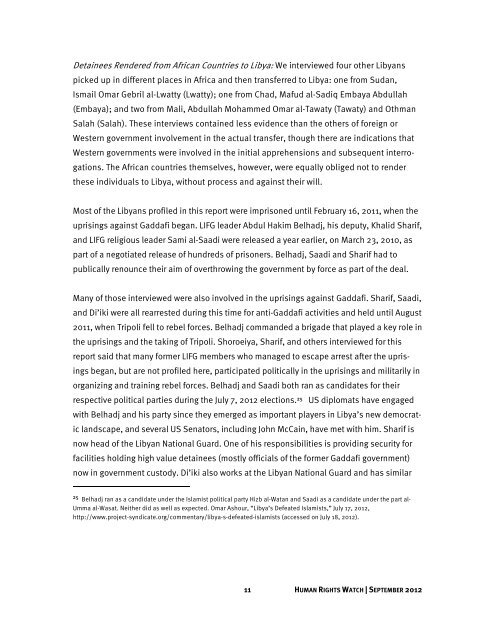Delivered Into Enemy Hands - Human Rights Watch
Delivered Into Enemy Hands - Human Rights Watch
Delivered Into Enemy Hands - Human Rights Watch
You also want an ePaper? Increase the reach of your titles
YUMPU automatically turns print PDFs into web optimized ePapers that Google loves.
Detainees Rendered from African Countries to Libya: We interviewed four other Libyans<br />
picked up in different places in Africa and then transferred to Libya: one from Sudan,<br />
Ismail Omar Gebril al-Lwatty (Lwatty); one from Chad, Mafud al-Sadiq Embaya Abdullah<br />
(Embaya); and two from Mali, Abdullah Mohammed Omar al-Tawaty (Tawaty) and Othman<br />
Salah (Salah). These interviews contained less evidence than the others of foreign or<br />
Western government involvement in the actual transfer, though there are indications that<br />
Western governments were involved in the initial apprehensions and subsequent interrogations.<br />
The African countries themselves, however, were equally obliged not to render<br />
these individuals to Libya, without process and against their will.<br />
Most of the Libyans profiled in this report were imprisoned until February 16, 2011, when the<br />
uprisings against Gaddafi began. LIFG leader Abdul Hakim Belhadj, his deputy, Khalid Sharif,<br />
and LIFG religious leader Sami al-Saadi were released a year earlier, on March 23, 2010, as<br />
part of a negotiated release of hundreds of prisoners. Belhadj, Saadi and Sharif had to<br />
publically renounce their aim of overthrowing the government by force as part of the deal.<br />
Many of those interviewed were also involved in the uprisings against Gaddafi. Sharif, Saadi,<br />
and Di’iki were all rearrested during this time for anti-Gaddafi activities and held until August<br />
2011, when Tripoli fell to rebel forces. Belhadj commanded a brigade that played a key role in<br />
the uprisings and the taking of Tripoli. Shoroeiya, Sharif, and others interviewed for this<br />
report said that many former LIFG members who managed to escape arrest after the uprisings<br />
began, but are not profiled here, participated politically in the uprisings and militarily in<br />
organizing and training rebel forces. Belhadj and Saadi both ran as candidates for their<br />
respective political parties during the July 7, 2012 elections. 25 US diplomats have engaged<br />
with Belhadj and his party since they emerged as important players in Libya’s new democratic<br />
landscape, and several US Senators, including John McCain, have met with him. Sharif is<br />
now head of the Libyan National Guard. One of his responsibilities is providing security for<br />
facilities holding high value detainees (mostly officials of the former Gaddafi government)<br />
now in government custody. Di’iki also works at the Libyan National Guard and has similar<br />
25 Belhadj ran as a candidate under the Islamist political party Hizb al-Watan and Saadi as a candidate under the part al-<br />
Umma al-Wasat. Neither did as well as expected. Omar Ashour, “Libya’s Defeated Islamists,” July 17, 2012,<br />
http://www.project-syndicate.org/commentary/libya-s-defeated-islamists (accessed on July 18, 2012).<br />
11 HUMAN RIGHTS WATCH | SEPTEMBER 2012
















